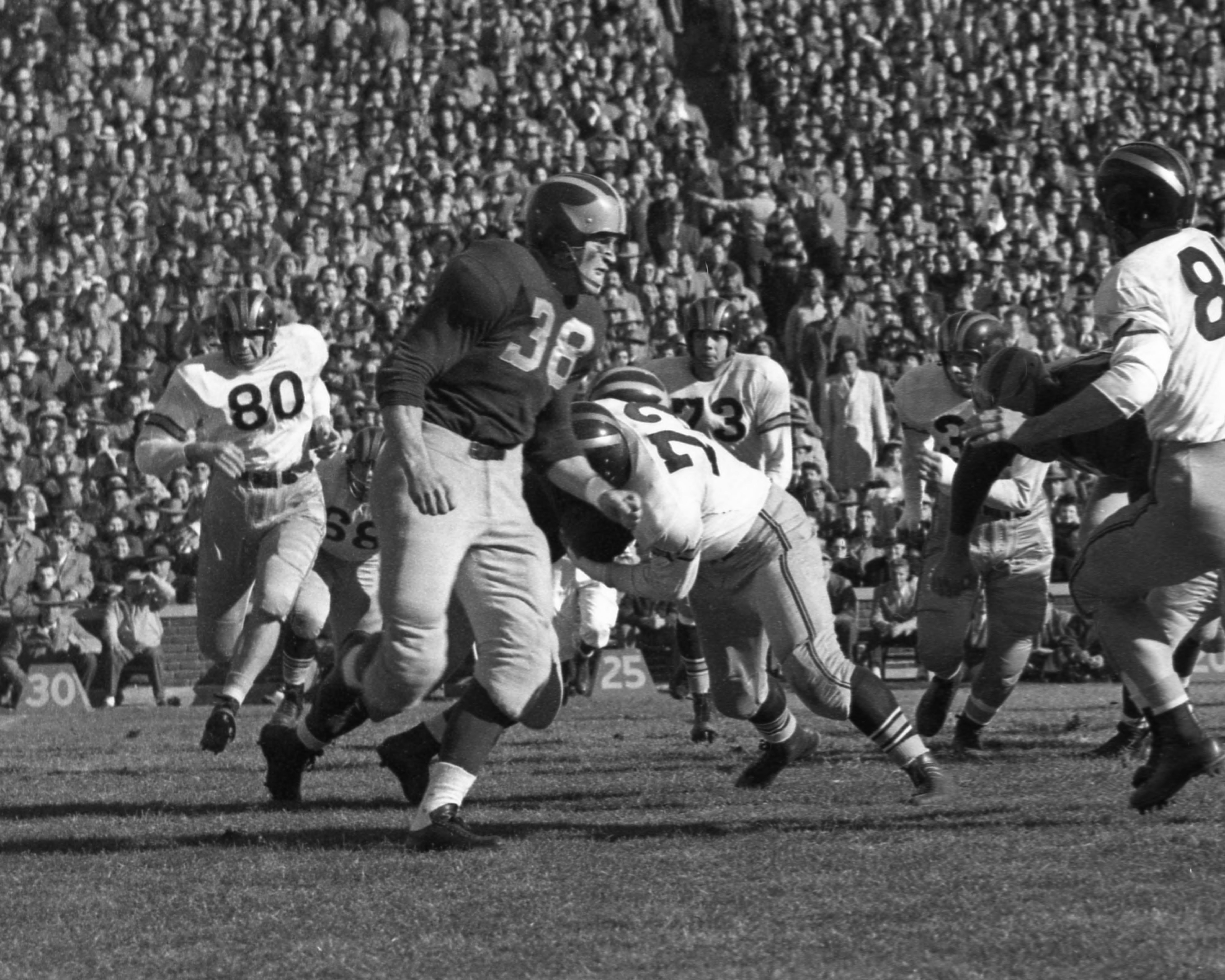Dick Kempthorn, MVP of 1949 Michigan team and war hero, dies at 92
 Tony Paul
Tony Paul
Richard "Dick" Kempthorn made his mark on the field for the Michigan Wolverines, as a member of the 1947 and 1948 national champions, and as the team's Most Valuable Player during the 1949 campaign.
He also made his mark on future teams when, one night in 1966, he took a 17-year-old high-school senior out for dinner at the fanciest steakhouse in Canton, Ohio.
That kid was Dan Dierdorf.
"And we just talked about the University of Michigan," Dierdorf recalled this week in a conversation with The Detroit News.
"He was just being really honest about what the university had done for him.
Dierdorf, who hadn't yet taken a visit to Michigan but had visited Ohio State and Michigan State, eventually became a Wolverine, an All-American, a College Football Hall-of-Famer and a Pro Football Hall-of-Famer. And he can't help but think about a single dinner that started him on his path to Ann Arbor — and also led to a great friendship that lasted more than 50 years.
"He stressed to me that Michigan is a school where they do everything right. Dick, and I don't think you ever met him, did you? Dick is one of those guys where the world is very black and white," Dierdorf said. "He never varied from that straight-and-narrow path, where there was a right way to do things. Ask anybody that ever met him.
"That's just the way he is, the way he was rather. He just tried to talk to me about what it means to go to a school like Michigan, what it means after you graduated, what it means to be a Michigan man. It wasn't a hard sell, by any stretch."
Dierdorf, 69, now an analyst on Michigan radio broadcasts, wasn't highly recruited coming out of high school. In fact, some rival schools thought so little of the offensive tackle, one Michigan State assistant coach called then-Michigan coach Bump Elliott after Dierdorf committed and said something to the effect of, "You must be hurting if you're down to signing somebody like him."
Dierdorf still believes somebody backed out of a scholarship, and that's how there was a spot for him.
Kempthorn saw something, though. And the rest is history.
Kempthorn, a fullback and linebacker, actually began his college career at Miami (Ohio), before joining the Marines, with whom he saw combat on the USS Wild Hunter in the invasion of the Philippines during World War II. After the war ended, he enrolled at Michigan, appeared in one game in 1947, before becoming a starter in 1948, when the Wolverines went 9-0 to win their second consecutive national championship. The 1949 team went 6-2-1, with Kempthorn scoring a touchdown in a Week 2 victory at Stanford.
That year marked the end of his football career.
"He never played professional football," Dierdorf said. "He could have."

Kempthorn was drafted in the 1948 NFL Draft in the 14th round the Philadelphia Eagles and the 1949 All-American Football Conference Secret Draft in the second round by the Cleveland Browns, but declined to pursue that career.
The reason? His father, who owned the booming dealership business in Canton.
"His father made it for him," Dierdorf said, adding that Kempthorn's father threatened to sell the dealerships out from under him if he chose pro football.
"That's some tough love."
It certainly worked out in the end.
After Kempthorn served as an assistant coach at Michigan in 1950 — legend has it, he gave his gloves to Michigan's punter to wear during the legendary 9-3 win over Ohio State in the "Snow Bowl" in Columbus, Ohio — he enlisted in the Air Force, and served in the Korean War. He served three years, flew more than 100 missions, once rescued a fellow pilot from a burning jet in Japan and eventually would receive the Distinguished Flying Cross. According to media reports at the time, including one from The Herald Palladium in Benton Harbor, during the 1947 team's five-year reunion in 1952, his Michigan teammates signed a football for Kempthorn and sent it to Korea.
The Korean War ended in 1953, and Kempthorn returned home, ready to work for his father, James. He bought the business, then selling Dodges and Plymouths, in 1960s, and eventually expanded it to sell the likes of Mercedes-Benz and Jaguar.
Whenever Dierdorf would return to Canton for the annual Hall-of-Fame ceremonies, Kempthorn always would have a Mercedes waiting at the airport for him.
Then there was Dierdorf's induction year, in 1996, after two years of just missing out. Kempthorn sent a plane for Dierdorf and his family. And then when Dierdorf arrived at the Akron-Canton Airport, there was another surprise — one that brings Dierdorf to chuckles, but one that he also kind of feels bad about.
"At the Akron-Canton Airport, he took out a billboard, put my picture up on the billboard and it said something like, 'Dan Dierdorf, Canton is so proud of you,' all this and all that," Dierdorf said. "You couldn't leave the Akron-Canton Airport without seeing it. Well, one of the other guys in my class, a senior nominee named Lou Creekmur who played for the great Detroit Lions teams of the 1950s, I knew his driver, everybody had a driver.
"Well, he saw my billboard and said to his driver, 'Can you take me to my billboard?' That poor driver had to say, 'Well, Lou, sorry, you don't have a billboard.'
"I don't think Lou was really getting into that explanation. I think he thought he was getting screwed."

It took Dierdorf quite some time to call "Mr. Kempthorn" by his first name Dick, given the age difference. But their friendship was real at an early age for Dierdorf.
When Dierdorf returned home for the summers during college, he worked for the city in the parks department, with Kempthorn getting him that job. After his rookie season in the NFL, Dierdorf also came home and worked at Kempthorn's dealership, not as a salesman — "He was smarter than that" — but doing odd jobs.
Years later, after his 13-year NFL career, Dierdorf did radio spots for the dealership.
Every time Dierdorf returned to Canton, he'd make sure to stop into the dealership. On the rare occasion, Kempthorn would make visits to Michigan, the last being two years ago, for a reunion of that 1947 team.
Once, Kempthorn gave Dierdorf a piece of art, depicting 100 years of Michigan football. It featured some legendary faces, like Tom Harmon, Gerald Ford, Ron Kramer and others. Also on there, Kempthorn and Dierdorf.
Dierdorf was in his office, staring at the art work, while he talked with a reporter Wednesday.
"That's how good of a player he was," Dierdorf said of Kempthorn, whose son Eric played at Michigan in the 1980s, and whose daughter Dana was an athlete at Michigan and later the head gymnastics coach . "He led a life worth remembering, at everything he accomplished."
Kempthorn also is survived by wife of 62 years, Lynn, son James, and eight grandchildren.
tpaul@detroitnews.com
Twitter: @tonypaul1984